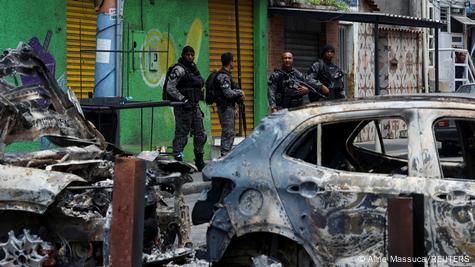Cliff Notes – At least 64 killed in major Rio drugs raid
- A large-scale police operation against the Comando Vermelho led to 81 arrests and 60 dead suspects, alongside four fatalities among police officers, according to Rio Governor Claudio Castro.
- The operation, involving 2,500 security personnel, targeted the Alemao and Penha favelas ahead of significant international events, reflecting a pattern of increased police actions before major gatherings.
- The police deployed two helicopters, 32 armoured vehicles and 12 demolition vehicles
- The UN human rights office condemned the operation, warning of the severe consequences of police actions in Brazil’s marginalised communities, highlighting concerns over police violence.
Latest from Rio drugs raid; 64 killed, 81 arrested & 2500 officers deployed
A large-scale narcotics operation against the Comando Vermelho, or Red Command, crime syndicate in Rio de Janeiro led to 81 arrests, 60 dead suspects and four dead police officers, Rio Governor Claudio Castro said on Tuesday.
“We stand firm confronting narcoterrorism,” Castro wrote on social media as he announced the operation.
He said that 2,500 security personnel were deployed across the impoverished and densely populated Alemao and Penha favela complexes on the outskirts of the Brazilian city, near the international airport.
“Regrettably, police officers were also among the dead,” Castro told a press conference later in the day.
State police said one suspect collared was the “right-hand man” of “one of the leaders” of Comando Vermelho.

The UN human rights office said Tuesday it was “horrified by the ongoing police operation” in Rio de Janeiro.
“This deadly operation furthers the trend of extreme lethal consequences of police operations in Brazil’s marginalised communities,” the UN human rights office posted on X.
Major police action as climate events near
Operation Containment, as authorities dubbed it, took place days before a pair of major events in the city prior to the COP30 global climate summit taking place far to the north of Rio in Belem, starting on November 10.
Brazil’s second most populous city will host two warm-up events next week: the C40 summit, bringing together mayors from more than 100 of the world’s major cities; and British heir to the throne Prince William’s Earthshot Prize, awarded to five winners each year for their contributions towards environmentalism.
That ceremony will feature celebrities, including pop singer Kylie Minogue and German four-time F1 world champion Sebastian Vettel.
Rio has already witnessed large-scale and sometimes heavy-handed police operations targeting crime-ridden poorer areas ahead of international events, with similar raids before 2014 World Cup matches, the 2016 Olympics, last year’s G20 summit and the BRICS summit earlier this year.
In February 2018, the government put military police in command of security in the city, citing the deteriorating situation.

Earlier this month, NGO Human Rights Watch (HRW) called on Mayor Castro to veto a new bill cleared in the state legislature which would pay police officers large bonuses if they “neutralize” suspects, warning it could lead to spikes in police killings.
“Giving bonuses to police for killings is not only outright brutal but also undermines public security by creating a financial incentive for officers to shoot rather than arrest suspects,” said Cesar Munoz, Brazil director at HRW.
Government bills operation as largest ever against Comando Vermelho
Authorities said they were seeking to serve 250 search and arrest warrants, deploying two helicopters, 32 armored vehicles and 12 “demolition vehicles,” used to destroy barricades erected by the traffickers.
Rio’s government described it as the largest ever operation targeting Comando Vermelho. Castro posted a video on social media of what he described as a drone launching a projectile, saying it showed the danger law enforcement was exposed to.
“This is how the Rio police are treated by criminals: with bombs dropped by drones. This is the scale of the challenge we face. This is not ordinary crime, but narcoterrorism,” he said.


